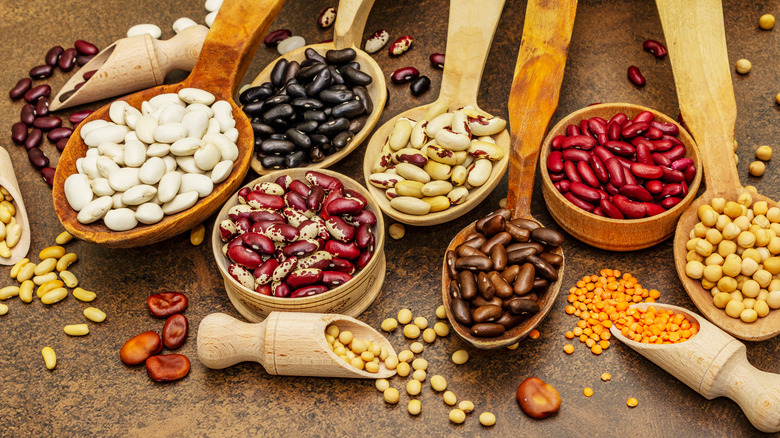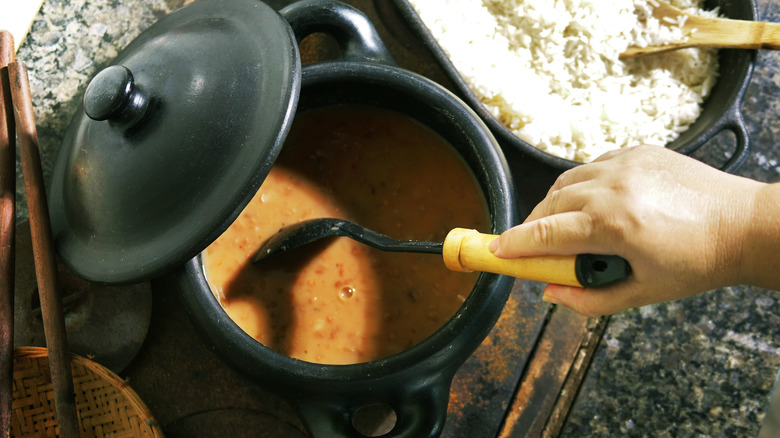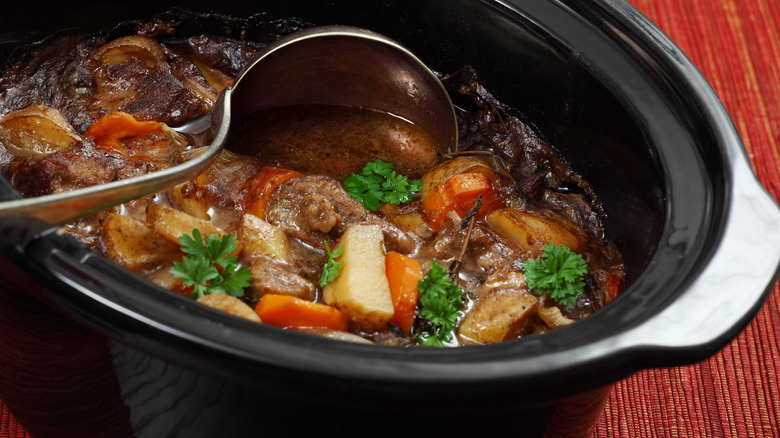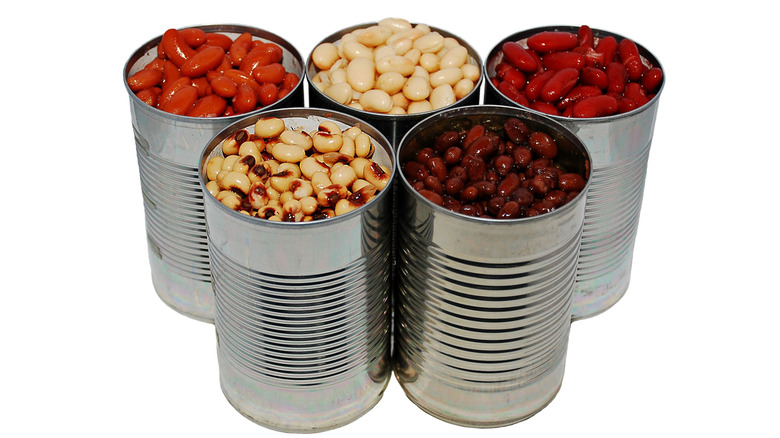Why You Shouldn't Cook Raw Beans In A Slow Cooker
Everybody loves a good food controversy, and perhaps none have been so enduring as the question about the right way to cook dried beans. The disagreement centers on whether or not beans should be soaked before cooking. Take this delicious vegan red beans and rice recipe designed for the Instant Pot; the directions unequivocally say to soak the dried beans for an hour before cooking. So that settles it, right?
Wrong. Russ Parsons, writing for the Los Angeles Times in his provocatively titled article, "Don't Soak Your Dried Beans! Now Even the Cool Kids Agree," obviously takes a different stance. The developer of the red beans and rice recipe is Miriam Hahn, and she cites two reasons for soaking the beans, explaining, "Soaking the beans helps them cook a little faster and also helps with digestion." Parsons thinks differently, arguing, "While soaking shortens the unattended cooking time of beans somewhat, the time saved is marginal and there are no other labor-saving benefits."
What's a home cook to do with this apparently conflicting advice? Getting to an answer means digging a bit deeper into the science.
It's all about the lectins
According to the Harvard School of Public Health, lectins are "proteins that bind to carbohydrates," and raw legumes and whole grains have very high levels of lectins. Sometimes our bodies have difficulty breaking down these proteins effectively, which can cause mild to severe gastrointestinal distress.
While based on that description, lectins sound terrifying, (like something we should just avoid altogether), let us offer a more nuanced understanding of them. Precision Nutrition explains that the common flour binder gluten is a lectin, and it's certainly a substance some people must carefully consume or avoid altogether. Phytohaemagglutinin (PHA) is the lectin that's present in high levels in raw beans, among other things. And while these two lectins can produce an inflammatory immune response, research suggests that lectins have health benefits as well, perhaps even cancer-fighting properties, for people who can tolerate them. And foods naturally high in lectins often have lots of healthy things in them, like vitamin B, healthy fats, fiber, and protein.
The key for the lectin-rich foods that are good for us is safely processing them by cooking, sprouting, or fermenting the foods to reduce the lectin content to a level that's safe for consumption.
And that's why your cooking method matters
So circling back to the debate, our guts certainly need help breaking down lectins, and there are a few things that can do so effectively. It turns out that (Hahn's method) soaking beans and boiling them for at least 10 minutes, says Chow Line, or (Parson's method) cooking them on high heat longer without soaking are good ways to give our bellies a break.
What absolutely doesn't work is cooking them "at low heat such as in a slow-cooker" because it "will not remove all the lectins" (via Harvard School of Public Health). Slow cookers on the low setting generally reach around 190 degrees Fahrenheit, according to Oven Spot, which is just not hot enough to get the job done. What's the difference in lectin content for raw kidney beans compared to properly cooked ones? It's huge, according to Precision Nutrition; raw kidney beans contain between 20,000 and 70,000 units of lectin, while safely cooked kidney beans contain between 200 and 400 lectin units. Boiling the beans eliminates the majority of the lectins, and slow cookers just don't get hot enough to make raw beans safe for consumption.
Rather than using a slow cooker, you can certainly try a delicious stovetop recipe for spicy pinto beans, but if you have a reason — and there are lots of good ones — for wanting to prepare your meal in a slow cooker, you do have options that will make your meal safe to consume.
How can you safely use beans in a slow cooker?
If you have lots of other kitchen tasks to accomplish or you want to throw ingredients in your slow cooker in order to come home to a perfectly (and safely) cooked dinner, your meal can still contain beans, as long as you handle them properly. Mother Would Know points out that one option is using canned beans, which have been cooked prior to canning. Another option is to cook the dried beans before adding them to your recipe, so you're certain they're safe.
Little Upgrades points out that slow cookers on the high setting typically get to about 300 degrees, which might cause you to assume it's safe to cook raw beans in your slow cooker if you use the high setting. Food Safety News, however, still doesn't recommend this practice as safe. Why? Studies of slow cooker casseroles demonstrated that the internal temperature didn't typically exceed 167 degrees, which clearly doesn't achieve the 212 degrees the USDA recommends as safe for ensuring the lectins in raw beans are neutralized. In order to ensure your beans are safe for use in your slow cooker, it's best to either cook your them ahead of time or buy canned.



